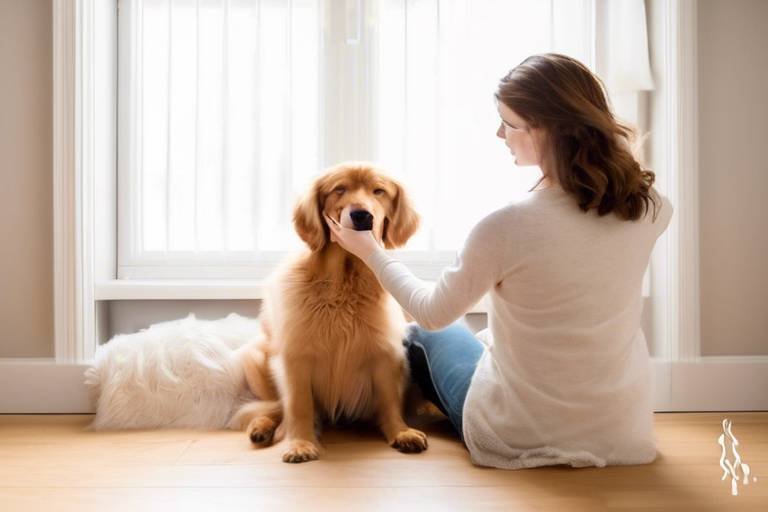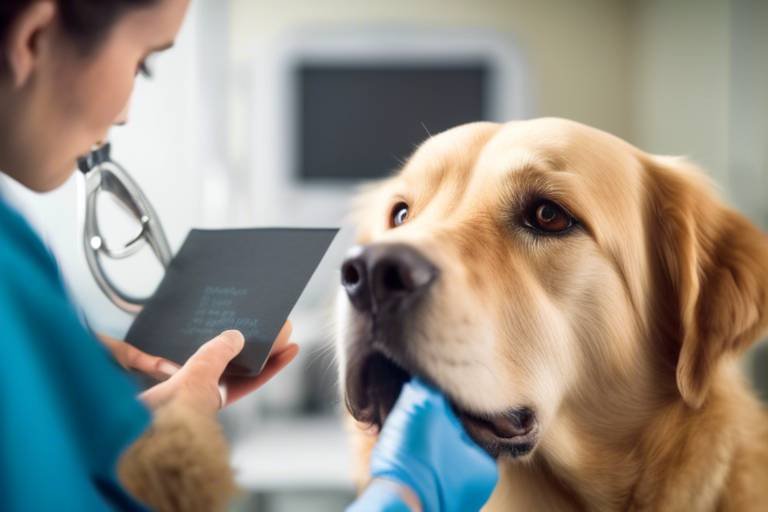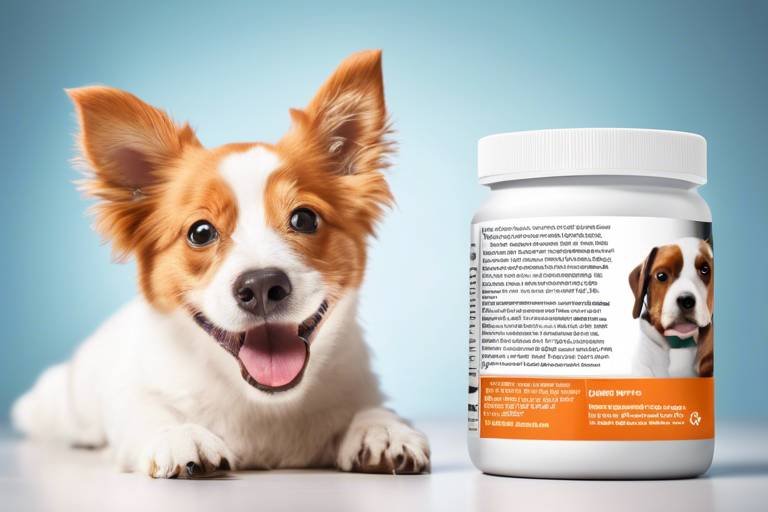Understanding the Benefits of Regular Vet Visits
When it comes to our beloved pets, ensuring their health and happiness is a top priority for any pet owner. Regular veterinary check-ups are not just a routine chore; they are a vital component of your pet's overall well-being. Imagine your pet as a car; just as you wouldn't drive around without regular maintenance, your furry friend needs the same level of care to thrive. Regular vet visits can be seen as a preventive measure, a way to catch potential health issues before they escalate into serious problems. In this article, we'll explore the myriad benefits of these visits, from preventive care to vaccinations and early detection of health issues, all aimed at ensuring a longer, healthier life for your pet.
Preventive care is the cornerstone of maintaining your pet's health. By scheduling regular vet visits, you are taking proactive steps to identify and address potential health concerns before they turn into major issues. Think of it as a health check-up for yourself; wouldn't you want to know if something was brewing under the surface? Regular check-ups can lead to early diagnosis of conditions such as obesity, dental disease, or even more serious illnesses like diabetes or kidney disease. The earlier these issues are detected, the better the chances of successful treatment. Plus, it often costs less to treat a condition in its early stages than to deal with the complications that arise from neglect.
One of the primary reasons for regular vet visits is to ensure your pet is up-to-date on their vaccinations. Vaccines are essential for protecting pets from various diseases that can be life-threatening. For instance, just like how we get flu shots to protect ourselves, pets also need vaccinations to fend off illnesses. Understanding the vaccination schedule is crucial for pet owners to maintain their furry friends' health effectively. Below is a quick overview of the core vaccines that every pet should receive:
| Core Vaccines | Purpose |
|---|---|
| Rabies Vaccine | Protects against rabies, a fatal disease that affects the brain and is transmissible to humans. |
| Distemper Vaccine | Prevents a severe viral disease that can cause respiratory, gastrointestinal, and neurological issues. |
| Parvovirus Vaccine | Protects against a highly contagious virus that can lead to severe gastrointestinal illness in dogs. |
As you can see, core vaccines are essential for all pets. However, there are also non-core vaccines that may be recommended based on your pet's lifestyle and risk factors. It's important to discuss these with your vet to tailor a vaccination plan that suits your pet's individual needs.
Regular vet visits facilitate the early detection of health problems, allowing for timely intervention and treatment. This proactive approach can significantly enhance your pet's quality of life. For example, routine blood tests during vet visits can reveal underlying health conditions that might not be visible during a physical examination. These tests provide crucial information that can lead to effective treatment plans and ongoing monitoring. Additionally, comprehensive physical examinations can help identify abnormalities early, leading to better health outcomes and extended lifespans for pets.
Veterinarians can also provide valuable insights into pet behavior during visits. This is particularly important for addressing behavioral issues early on, ensuring a harmonious relationship between pets and their families. Whether it's anxiety, aggression, or other behavior-related concerns, your vet can offer tailored advice and solutions to help improve your pet's behavior.
Lastly, regular visits to the vet help strengthen the bond between pets and their owners. Familiarity with the vet can reduce anxiety and improve the overall experience for pets during check-ups. When pets associate the vet's office with positive experiences, they are more likely to remain calm and cooperative during examinations. This not only benefits their health but also enhances the relationship you share with your furry friend.
- How often should I take my pet to the vet? Generally, pets should have a check-up at least once a year. However, older pets or those with health issues may require more frequent visits.
- What should I expect during a vet visit? Expect a thorough physical examination, discussions about your pet's health and behavior, and possibly vaccinations or blood tests.
- Are vaccinations really necessary? Yes, vaccinations are essential for preventing serious diseases and maintaining your pet's health.

Importance of Preventive Care
When it comes to our beloved pets, the phrase "an ounce of prevention is worth a pound of cure" couldn't be more accurate. Regular veterinary visits are the cornerstone of preventive care, playing a vital role in keeping our furry friends healthy and happy. Imagine a world where we could catch health issues before they escalate into serious problems; this is precisely what routine check-ups offer. By taking your pet to the vet regularly, you are not just being a responsible pet owner; you are actively contributing to their long-term well-being.
Preventive care encompasses various aspects of your pet's health, including vaccinations, dental care, and nutritional advice. These visits allow veterinarians to assess your pet’s overall health and identify any potential issues that may not be immediately visible. For instance, conditions like diabetes or kidney disease can develop silently, but with regular check-ups, vets can catch these problems early, leading to more effective treatment options.
Moreover, preventive care can save you money in the long run. Think of it like maintaining your car; regular oil changes and check-ups can prevent a major breakdown later on. Similarly, investing in your pet's health through regular vet visits can help you avoid costly emergency treatments that arise from neglected health issues. By ensuring that your pet is up-to-date on vaccinations and receiving routine examinations, you are essentially safeguarding their health and your wallet.
In addition to physical health, these visits also offer an opportunity for pet owners to discuss behavioral concerns. Whether it's anxiety, aggression, or any other behavioral issues, your vet can provide valuable insights and recommendations. By addressing these problems early on, you can foster a more harmonious relationship between your pet and your family.
In conclusion, the importance of preventive care cannot be overstated. It is an investment in your pet’s health, happiness, and longevity. By establishing a routine of regular veterinary visits, you are giving your furry companion the best chance at a long, fulfilling life. So, why wait? Schedule that appointment today and take the first step towards a healthier future for your pet!

Vaccinations and Disease Prevention
Vaccinations are like a superhero cape for our pets, providing them with the protection they need against a range of diseases that can be not only debilitating but also fatal. Just as we wouldn’t send our kids out into the world without their vaccinations, we shouldn’t let our furry friends face the world unprotected either. Regular veterinary visits ensure that your pet receives their vaccinations on time, keeping their immune system primed and ready to fight off potential threats. Understanding the vaccination schedule is crucial for pet owners, as it can be the difference between a healthy pet and one that falls ill.
Core vaccines are the foundation of a good health plan for pets. These are the vaccines that every pet should receive, regardless of their lifestyle. They protect against common and severe diseases that can wreak havoc on your pet's health. Here’s a quick overview of the core vaccines that your pet might need:
| Vaccine | Prevented Disease | Recommended Age |
|---|---|---|
| Rabies Vaccine | Rabies | First dose at 12-16 weeks |
| Distemper Vaccine | Distemper | First dose at 6-8 weeks |
| Parvovirus Vaccine | Parvovirus | First dose at 6-8 weeks |
Now, let’s dive deeper into some of these essential vaccines. The Rabies vaccine is not just a recommendation; it’s a legal requirement in many places. This vaccine protects not only your pet but also the public from this deadly disease. Understanding its importance can help you comply with local laws and ensure the safety of your community.
Then there are the Distemper and Parvovirus vaccines, which are crucial for puppies and kittens. These viruses can lead to severe illness and even death, especially in young animals. Early vaccination is a proactive step that can prevent these life-threatening diseases, emphasizing the need for timely vet visits. Imagine your puppy growing up healthy and strong, free from the fear of these diseases, all because you took that crucial step to vaccinate them on time.
On the flip side, we have non-core vaccines, which are tailored to your pet's specific lifestyle and risk factors. For instance, if your pet frequently interacts with other animals or spends a lot of time outdoors, they may need additional vaccines. Discussing these options with your vet can help you create a personalized vaccination plan that suits your pet’s needs perfectly. This tailored approach ensures that your pet is not only protected but also thriving in their environment.
In conclusion, vaccinations are a vital part of preventive care for pets. Regular vet visits not only keep their vaccinations up to date but also foster a proactive approach to their health. By understanding the importance of vaccinations, you can make informed decisions that contribute to your pet's long-term well-being. So, don’t wait! Schedule that vet visit today and give your pet the gift of health and happiness.
- How often should my pet visit the vet for vaccinations? - Generally, pets should visit the vet at least once a year for vaccinations, but puppies and kittens may need more frequent visits.
- Are there any side effects to vaccinations? - Some pets may experience mild side effects such as soreness at the injection site or lethargy, but serious side effects are rare.
- Can I vaccinate my pet at home? - It is highly recommended to have a veterinarian administer vaccinations to ensure they are done safely and correctly.
Core Vaccines
When it comes to keeping our furry friends safe and healthy, are among the most important tools in every pet owner's toolbox. These vaccines are essential for all pets, regardless of their breed or lifestyle, as they provide crucial protection against some of the most common and severe diseases that can affect our companions. Think of core vaccines as the foundation of your pet's health; without them, you're leaving them vulnerable to illnesses that could easily be prevented.
Core vaccines typically include the following:
- Rabies Vaccine: This vaccine is not only vital for your pet's health but also a legal requirement in many areas. Rabies is a deadly virus that can affect both animals and humans, making this vaccine a top priority for all pets.
- Distemper Vaccine: Canine distemper is a highly contagious disease that can be fatal. This vaccine is crucial for puppies and adult dogs alike, providing immunity against this serious threat.
- Parvovirus Vaccine: Parvovirus is another severe illness that primarily affects puppies, leading to severe gastrointestinal distress. Vaccinating against parvovirus is essential for preventing this life-threatening disease.
- Feline Viral Rhinotracheitis (FVR) Vaccine: For our feline friends, this vaccine protects against a common respiratory virus that can lead to serious complications.
- Calicivirus Vaccine: Another important vaccine for cats, calicivirus can cause severe respiratory issues and oral disease.
By understanding the significance of these core vaccines, pet owners can make informed decisions about their pets' health. It's essential to work closely with your veterinarian to establish a vaccination schedule that aligns with your pet's specific needs and lifestyle. Regular check-ups ensure that your pet receives these vaccines on time, providing the best defense against potential health threats.
Moreover, many pet owners might wonder, "When should I start vaccinating my pet?" Generally, puppies and kittens begin their vaccination series at around six to eight weeks of age, with boosters given at regular intervals until they are about four months old. This early vaccination is crucial as it helps build a strong immune system that can ward off diseases as they grow. Remember, the earlier you start, the better equipped your pet will be to face the world!
In conclusion, core vaccines are a fundamental aspect of your pet's healthcare regimen. They not only protect your pets but also contribute to the overall health of the community by preventing the spread of infectious diseases. So, don’t wait until it’s too late; schedule that vet visit today and give your beloved pet the gift of health!
1. How often should my pet be vaccinated?
Most pets require vaccinations annually or every three years, depending on the vaccine and your veterinarian's recommendation. Regular check-ups will help you stay on track with your pet's vaccination schedule.
2. Are there any side effects to vaccines?
While most pets tolerate vaccines well, some may experience mild side effects such as lethargy or a slight fever. Serious reactions are rare but should be reported to your vet immediately.
3. Can my pet still get sick if they are vaccinated?
Vaccines significantly reduce the risk of certain diseases, but they do not guarantee complete immunity. Regular vet visits and preventive care are crucial for your pet's overall health.
4. What should I do if I miss a vaccination appointment?
If you miss a vaccination appointment, contact your veterinarian as soon as possible to reschedule. They can advise you on the best course of action to keep your pet protected.
Rabies Vaccine
The is not just another shot your pet needs; it’s a critical component of their health and safety. Rabies is a viral disease that affects the central nervous system and is almost always fatal once symptoms appear. This makes vaccination essential, not only for your pet's protection but also for public health. In fact, rabies is a zoonotic disease, meaning it can be transmitted from animals to humans. This highlights the importance of keeping your furry friend vaccinated.
In many regions, rabies vaccinations are required by law. Compliance with these regulations is crucial, as it helps control the spread of this deadly virus. But beyond legal obligations, consider the emotional aspect: knowing your pet is protected from rabies provides peace of mind. Imagine the relief of being able to take your dog to the park or let your cat explore the backyard without the constant worry of rabies exposure.
Typically, the rabies vaccine is administered when pets are around 12 to 16 weeks old, with a booster shot given one year later. After the initial series, the frequency of boosters can vary based on local regulations and the type of vaccine used. Some vaccines provide protection for three years, while others may require annual boosters. It's essential to consult with your veterinarian to determine the best schedule for your pet.
Additionally, the rabies vaccine is a great opportunity for a vet visit where your pet can receive a thorough check-up. During this time, veterinarians can assess your pet's overall health and address any concerns you might have. This holistic approach ensures that your pet not only stays protected against rabies but also maintains optimal health.
In summary, the rabies vaccine is a vital aspect of pet care that protects your furry friend and contributes to community health. Regular vet visits for vaccinations, including rabies, are crucial for your pet's long-term well-being. So, next time you schedule a vet appointment, remember that you're not just checking off a box; you're actively safeguarding your pet's life.
- How often does my pet need the rabies vaccine?
Most pets need a rabies booster every 1 to 3 years, depending on local laws and the type of vaccine used. - What are the side effects of the rabies vaccine?
Side effects are generally mild and may include soreness at the injection site, slight fever, or lethargy. - Can my pet get rabies if they are vaccinated?
While the vaccine is highly effective, no vaccine offers 100% protection. However, vaccinated pets are much less likely to contract the disease. - Is the rabies vaccine necessary for indoor cats?
Yes, even indoor cats should be vaccinated as they can still be exposed to rabies through interactions with other animals.
Distemper and Parvovirus Vaccines
The distemper and parvovirus vaccines are not just routine shots; they are critical lifelines for puppies and kittens. These vaccines act as a shield against two of the most dangerous diseases that can afflict our beloved pets. Distemper, a viral infection, can lead to severe respiratory, gastrointestinal, and neurological problems, while parvovirus is notorious for causing severe vomiting and diarrhea, often leading to dehydration and, in some cases, death. Understanding the significance of these vaccines is vital for every pet owner.
Both distemper and parvovirus can spread rapidly among unvaccinated animals, making it essential to vaccinate early and keep up with booster shots. Puppies typically receive their first distemper and parvovirus vaccinations between six to eight weeks of age, followed by a series of boosters every three to four weeks until they are around 16 weeks old. This early vaccination schedule is crucial because it protects them during a vulnerable stage in their lives when they are more susceptible to infections.
Moreover, the impact of these vaccines extends beyond individual pets. When a significant percentage of the pet population is vaccinated, it creates a phenomenon known as herd immunity, which helps protect those who cannot be vaccinated due to health issues. This collective effort is vital in controlling outbreaks and ensuring a healthier community for pets and their owners alike.
In addition to the physical health benefits, vaccinating against distemper and parvovirus also brings peace of mind to pet owners. Knowing that your furry friend is protected from these severe diseases allows you to focus on creating joyful memories together rather than worrying about potential health crises. Regular vet visits to monitor vaccination schedules and discuss any concerns play a crucial role in maintaining your pet's health.
| Vaccine | Age of First Dose | Booster Schedule |
|---|---|---|
| Distemper | 6-8 weeks | Every 3-4 weeks until 16 weeks |
| Parvovirus | 6-8 weeks | Every 3-4 weeks until 16 weeks |
In summary, vaccinating your pets against distemper and parvovirus is not just a responsibility but a necessity. It is a small investment of time and resources that can yield immense benefits, ensuring that your furry companions lead long, healthy lives. Don’t wait until it’s too late; make sure your pets are up to date with their vaccinations and schedule those vet visits!
Non-Core Vaccines
When it comes to keeping our furry friends healthy, play an essential role, tailored to fit the specific needs of each pet based on their lifestyle and environmental exposure. Unlike core vaccines, which are necessary for all pets, non-core vaccines are optional and recommended only for those pets that may be at risk due to their unique circumstances. For instance, pets that frequently interact with other animals, travel, or live in areas with specific disease outbreaks may benefit from these additional vaccines.
It's crucial to have an open dialogue with your veterinarian about your pet's lifestyle, as this will help determine which non-core vaccines are appropriate. Some of the common non-core vaccines include:
- Bordetella bronchiseptica: Often referred to as the kennel cough vaccine, this is particularly important for pets that are frequently boarded or attend dog parks.
- Leptospirosis: This vaccine protects against a bacterial infection that can be contracted through contaminated water or soil, making it vital for pets that enjoy outdoor adventures.
- Lyme disease: If you live in an area where ticks are prevalent, this vaccine can provide essential protection against Lyme disease, which can have serious health implications.
Understanding the significance of these non-core vaccines can empower pet owners to make informed decisions. For example, if your dog loves to romp around in the woods, discussing the Lyme disease vaccine with your vet could be a game-changer. Additionally, staying updated on local outbreaks or health advisories can also guide your decisions regarding non-core vaccinations.
In summary, non-core vaccines are not one-size-fits-all; they are like a tailored suit, designed to fit the individual needs of your pet. Regular veterinary visits will ensure that you stay informed about which vaccines are necessary, helping you keep your beloved companion safe and healthy.
Q1: Are non-core vaccines necessary for my pet?
A1: Non-core vaccines are not necessary for every pet, but they are recommended based on your pet's lifestyle and risk factors. It's best to consult with your veterinarian to determine what is right for your pet.
Q2: How often should my pet receive non-core vaccines?
A2: The frequency of non-core vaccines can vary. Your veterinarian will provide a vaccination schedule tailored to your pet's needs, which may include annual or biannual visits.
Q3: What are the risks of not vaccinating my pet with non-core vaccines?
A3: Skipping non-core vaccines may leave your pet vulnerable to specific diseases, especially if they are exposed to environments where these diseases are prevalent. Always discuss the potential risks with your vet.

Early Detection of Health Issues
When it comes to our beloved pets, we often wish we could read their minds or know exactly how they feel. Unfortunately, they can't tell us when something's wrong, which is why regular vet visits are so crucial. Think of these check-ups as a health insurance policy for your furry friend. They allow for the , which can make all the difference in their quality of life.
During a routine vet visit, a veterinarian doesn't just check for obvious signs of illness; they perform a thorough examination that can reveal hidden problems. For instance, conditions like diabetes, kidney disease, or even certain cancers can develop silently. By catching these issues early, you can take action before they escalate into serious health crises. It’s like finding a crack in the foundation of your house before it turns into a major structural issue—early intervention saves you time, money, and heartache.
One of the tools vets use to detect health issues early is routine blood tests. These tests can uncover a wealth of information about your pet's internal health, including organ function and blood cell counts. For example, a simple blood test can reveal if your pet has an infection or if their liver is not functioning as it should. The earlier these problems are identified, the better the treatment options available.
| Health Issue | Importance of Early Detection | Potential Treatment Options |
|---|---|---|
| Diabetes | Prevents serious complications | Insulin therapy, dietary changes |
| Kidney Disease | Slows progression | Special diets, medications |
| Cancers | Increases survival chances | Surgery, chemotherapy |
In addition to blood tests, comprehensive physical examinations are vital. During these assessments, the vet will check your pet's weight, coat condition, and even their dental health. They’ll look for signs of abnormalities such as lumps, bumps, or skin irritations that you might not have noticed. These physical checks can lead to the early detection of issues that could otherwise go unnoticed until they become severe.
Moreover, regular vet visits are not just about physical health; they also provide an opportunity for veterinarians to assess your pet's behavior. Behavioral changes can often be the first sign of an underlying health issue. For example, if your normally playful pup suddenly becomes lethargic, it could indicate pain or discomfort. Addressing these behavioral shifts early can help maintain a harmonious relationship between you and your pet, ensuring they remain a cherished member of your family.
In conclusion, regular vet visits are an essential part of responsible pet ownership. They allow for the , which can lead to timely interventions, better treatment outcomes, and ultimately, a longer and healthier life for your pet. So, the next time you think about skipping that vet appointment, remember: a little prevention goes a long way!
- How often should I take my pet to the vet? It's generally recommended to take your pet for a check-up at least once a year, but older pets or those with health issues may need more frequent visits.
- What should I expect during a vet visit? Expect a thorough examination, vaccinations, and possible blood tests, along with a discussion about your pet's diet, behavior, and any concerns you may have.
- Are vet visits expensive? While costs can vary, investing in regular check-ups can save you money in the long run by preventing serious health issues.
Routine Blood Tests
When it comes to our beloved pets, are like a crystal ball into their health. These tests are not just a formality; they are essential tools that can reveal a wealth of information about your pet's internal health status. Imagine being able to catch potential health issues before they escalate into serious problems! That's the power of a simple blood test.
During a typical veterinary visit, the vet may recommend a blood test to evaluate various aspects of your pet's health. This can include checking organ function, assessing blood cell counts, and even detecting infections or metabolic disorders. For instance, a blood test can help identify conditions such as diabetes, kidney disease, or liver dysfunction long before you might notice any symptoms at home.
But what exactly do these tests measure? Here’s a quick rundown:
| Test Type | What It Measures |
|---|---|
| Complete Blood Count (CBC) | Assesses overall health and detects a variety of disorders, including anemia and infection. |
| Blood Chemistry Panel | Evaluates organ function and metabolic status, checking things like liver and kidney health. |
| Thyroid Tests | Checks thyroid hormone levels, which can indicate hyperthyroidism or hypothyroidism. |
By regularly scheduling these tests, you not only keep your pet’s health in check but also equip your veterinarian with the necessary data to make informed decisions about treatment plans. It’s like having a health insurance policy for your pet’s well-being!
Moreover, routine blood tests can also be a great way to monitor your pet's health as they age. Just like we go for annual check-ups, our furry friends benefit from these assessments too. They provide a baseline for your pet’s health, making it easier to spot any changes over time. It’s a proactive approach that can lead to a longer, happier life for your pet.
In conclusion, routine blood tests are a small investment of time and resources that can yield significant health benefits for your pet. So, the next time you’re at the vet, don’t hesitate to ask about blood testing. It’s a simple step that can make a world of difference in your pet’s health journey!
- How often should my pet have blood tests? Generally, it’s recommended to have blood tests annually, but your vet may suggest more frequent testing based on your pet's age, health status, and risk factors.
- Are blood tests safe for my pet? Yes, blood tests are safe and involve only a small amount of blood, usually taken from a vein in the leg.
- What should I do if my pet's blood test results are abnormal? If your pet's results are abnormal, your veterinarian will discuss the next steps, which may include further testing or treatment options.
Physical Examinations
When it comes to ensuring the health and happiness of our beloved pets, are absolutely essential. Think of a vet visit as a routine check-up for your furry friend—just like we humans need our annual physicals to monitor our health, pets require the same level of attention. During these examinations, veterinarians perform a thorough assessment of your pet's overall health, which can help identify any potential issues before they escalate into serious problems. This proactive approach is akin to catching a small leak in your roof before it turns into a waterfall in your living room!
Typically, a physical examination includes a comprehensive evaluation of your pet's body condition, weight, coat, skin, and eyes. The vet will also check the heart and lungs, ensuring that everything is functioning as it should. Imagine the vet as a detective, looking for clues that might indicate underlying health issues. For instance, if your dog is gaining weight rapidly, it could be a sign of a metabolic disorder or an unhealthy diet. By catching these signs early, you can work with your veterinarian to develop a tailored plan that addresses any concerns.
Moreover, physical examinations are not just about identifying health problems; they also serve as an opportunity for pet owners to ask questions about their pet's well-being. Whether you're curious about your pet's diet, exercise routine, or behavioral changes, the vet is there to provide guidance and support. This open line of communication fosters a collaborative relationship between you and your veterinarian, ensuring that you are both on the same page when it comes to your pet's health.
It's also worth noting that the frequency of these examinations can vary based on your pet's age, breed, and overall health. Puppies and kittens, for example, may require more frequent visits to monitor their growth and development, while older pets might need regular check-ups to manage age-related health issues. A general guideline is to schedule a vet visit at least once a year for adult pets and more often for younger or senior pets. This way, you can stay ahead of any potential health concerns and keep your furry friend happy and healthy for years to come.
In conclusion, regular physical examinations are a cornerstone of preventive care for pets. They not only help in the early detection of health issues but also strengthen the bond between you and your pet. By making these visits a priority, you’re investing in a longer, healthier life for your furry companion. So, the next time you schedule a vet appointment, remember that you’re not just checking off a box on your to-do list; you’re taking a proactive step toward ensuring your pet’s well-being.
- How often should I take my pet to the vet for a physical examination?
It is generally recommended to take adult pets for a check-up at least once a year, while puppies and kittens may need more frequent visits. - What should I expect during a physical examination?
Your veterinarian will assess your pet’s weight, coat, skin, eyes, heart, and lungs, among other things. It’s also a good time to discuss any concerns you may have. - Are physical examinations necessary if my pet seems healthy?
Yes! Regular check-ups can help detect underlying health issues before they become serious, ensuring your pet remains in good health. - Can I ask my vet questions during the examination?
Absolutely! Your vet is there to help and provide guidance on all aspects of your pet's health.

Behavioral Assessments
When it comes to our beloved pets, understanding their behavior is just as crucial as monitoring their physical health. Regular veterinary visits provide an excellent opportunity for . These assessments can help identify any behavioral issues your pet may be experiencing, which can often stem from anxiety, stress, or even underlying health problems. Just like humans, pets can have their off days, and sometimes those days turn into patterns that need addressing.
During a vet visit, veterinarians can observe your pet's behavior in a controlled environment, allowing them to spot signs that you might miss at home. For instance, if your dog is unusually aggressive or your cat is hiding more than usual, these could be red flags indicating discomfort or distress. By discussing these observations with your vet, you can work together to develop a plan that addresses your pet's specific needs.
Behavioral assessments can also include a review of your pet's daily routine, diet, and interactions with family members. Here are a few common behavioral issues that vets often help with:
- Separation Anxiety: Pets can become distressed when left alone, leading to destructive behavior.
- Excessive Barking or Meowing: This could indicate boredom or a need for attention.
- Fear of Loud Noises: Many pets are sensitive to fireworks or thunderstorms, which can trigger anxiety.
By proactively addressing these issues during your vet visits, you can help create a more harmonious living environment for both your pet and your family. It’s essential to remember that behavioral problems can often be mitigated with proper training and socialization. Your veterinarian can provide valuable resources or recommend a professional trainer if needed.
In addition to addressing existing behavioral concerns, regular vet visits also foster a sense of familiarity and comfort for your pet. The more your furry friend visits the vet, the less anxious they will become over time. This familiarity can transform the vet's office from a place of fear into a place of comfort, making check-ups a breeze instead of a battle.
| Question | Answer |
|---|---|
| How often should I take my pet for a vet visit? | It's generally recommended to take your pet for a vet visit at least once a year, but more frequent visits may be necessary for older pets or those with health issues. |
| What should I expect during a behavioral assessment? | Your vet will observe your pet's behavior, ask about their daily routine and interactions, and may suggest strategies for improvement based on their findings. |
| Can behavioral issues be treated without medication? | Yes, many behavioral issues can be addressed through training, environmental changes, and consistent routines without the need for medication. |

Building a Stronger Bond
When it comes to our furry friends, building a strong bond is essential for their happiness and well-being. Regular visits to the vet can significantly contribute to this bond in several ways. First off, think about your pet's perspective: a trip to the vet can be a stressful experience. However, if you make these visits a routine part of their life, your pet will begin to associate the vet with positive experiences rather than just anxiety. This familiarity can lead to a more relaxed demeanor during check-ups, ultimately making the whole process smoother for both of you.
Moreover, during these visits, you and your veterinarian can work together as a team to ensure the best care for your pet. This collaboration fosters a sense of trust, not only between you and the vet but also between you and your pet. When your pet sees you actively involved in their health care, it reassures them that they are in good hands. Just like a child feels safe and secure when their parents are present during a doctor's visit, pets too can feel more at ease when they know their owners are advocating for their well-being.
Another critical aspect of strengthening the bond with your pet through vet visits is the opportunity for learning. Each visit is a chance to gather valuable information about your pet's health, behavior, and nutrition. For example, your vet can provide insights on proper diet, exercise routines, and even behavioral tips that can enhance your pet's quality of life. Armed with this knowledge, you can make informed decisions that benefit your pet, leading to a happier and healthier companion. After all, knowledge is power, and when it comes to your pet's health, being well-informed can make all the difference.
Additionally, consider the emotional connection that develops when you take the time to care for your pet's health. Just as you would want your loved ones to receive the best care possible, your pet deserves that same level of attention. Regular vet visits show your commitment to their health, which in turn strengthens the emotional bond between you. Pets are incredibly intuitive; they can sense when you are invested in their well-being, and this can lead to a deeper connection. Just imagine the joy on your pet's face when they realize that those trips to the vet are not just about needles and check-ups, but about ensuring they live a long, happy life by your side.
In conclusion, regular vet visits are more than just a health necessity; they are a profound opportunity to build a stronger bond with your pet. By creating positive experiences, fostering trust, gaining knowledge, and demonstrating your commitment to their health, you can transform those routine check-ups into meaningful moments that deepen your relationship. So, the next time you schedule a vet appointment, remember that you are not just ensuring your pet's health; you are also nurturing the invaluable bond that you share.
- How often should I take my pet to the vet? - Generally, it is recommended to take pets for a check-up at least once a year, but puppies and kittens may require more frequent visits.
- What should I expect during a vet visit? - Expect a thorough examination, vaccinations, and a discussion about your pet's health and behavior.
- Can I ask my vet questions about my pet's behavior? - Absolutely! Vets are there to help with all aspects of your pet's health, including behavioral concerns.
- How can I make vet visits less stressful for my pet? - Bring treats, stay calm, and consider visiting the vet just to socialize when it’s not a check-up.
Frequently Asked Questions
- Why are regular vet visits important for my pet?
Regular vet visits are crucial because they help identify potential health issues before they escalate. Think of it as a routine check-up for your furry friend, ensuring they stay healthy and happy for years to come!
- What vaccinations does my pet need?
Your pet needs both core and non-core vaccinations. Core vaccines protect against common diseases like rabies, distemper, and parvovirus, while non-core vaccines are tailored to your pet's lifestyle and risk factors. Discussing this with your vet will help you create the best vaccination plan.
- How often should I take my pet to the vet?
It's generally recommended to take your pet to the vet at least once a year for a wellness check. However, younger pets, older pets, or those with health issues may need more frequent visits. Regular check-ups keep your pet in tip-top shape!
- What happens during a routine vet visit?
A routine vet visit typically includes a comprehensive physical examination, vaccinations, and possibly routine blood tests. Your vet will check your pet's overall health and look for any signs of illness, ensuring everything is on track.
- Can regular vet visits help with behavioral issues?
Absolutely! Vets can provide valuable insights into your pet's behavior during visits. If you notice any troubling behaviors, discussing them with your vet can lead to effective solutions and a happier home for everyone.
- How can I help my pet feel more comfortable at the vet?
Familiarizing your pet with the vet's office can help reduce anxiety. Bring them in for quick visits just to say hi, or reward them with treats after appointments. Building a positive association with vet visits makes a world of difference!
- What should I do if my pet is due for vaccinations?
If your pet is due for vaccinations, schedule an appointment with your vet as soon as possible. Keeping up with vaccinations is vital for your pet's health and helps protect them from serious diseases.
- What are routine blood tests, and why are they important?
Routine blood tests are essential for detecting underlying health conditions that may not be visible during a physical exam. They provide your vet with important data to create effective treatment plans and monitor your pet's health over time.



















